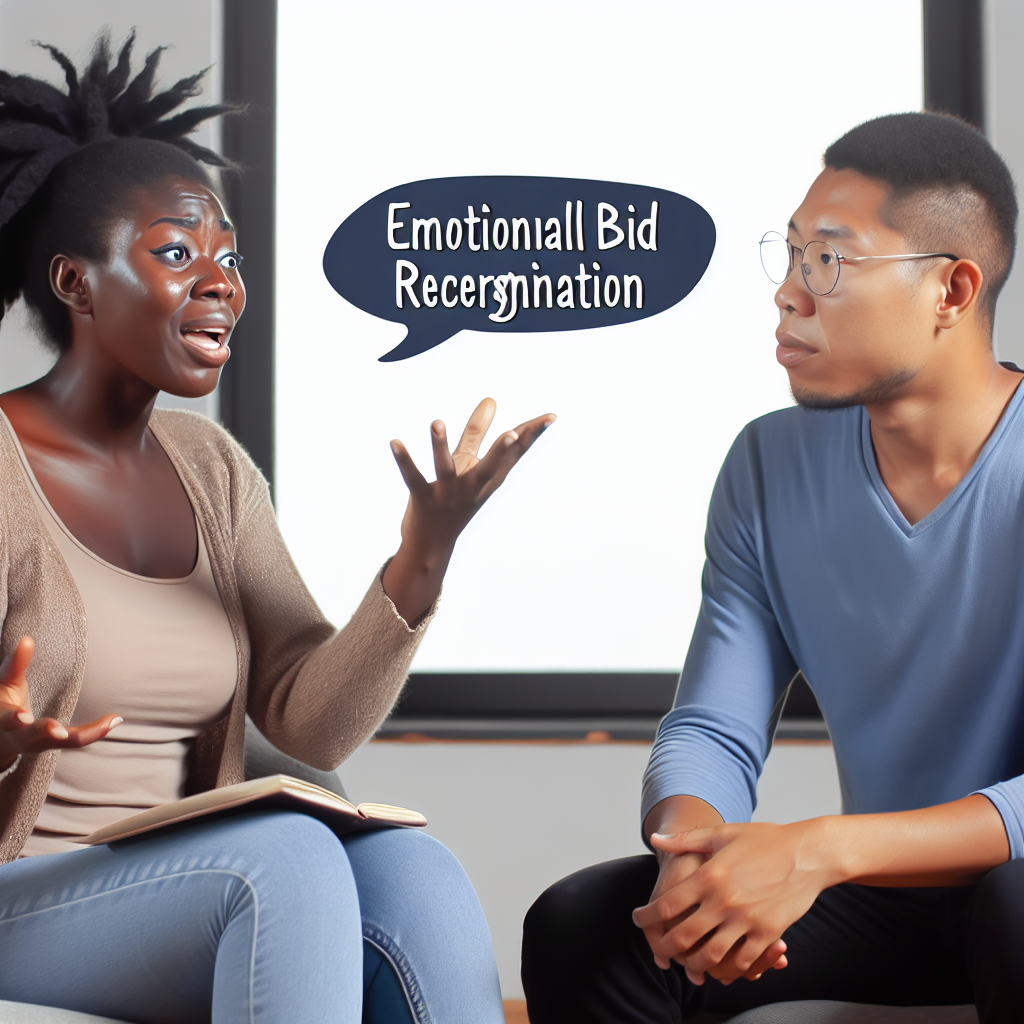# Emotional Bid Recognition: Responding to Subtle Connection Attempts in Relationships
Why Small Gestures Matter More Than Swipes: The Hidden Currency of Connection
Modern dating runs deeper than matching hobbies or swiping right on a profile picture. While initial attraction is vital, the longevity, quality, and intimacy of a romantic partnership often hinge on the smallest social exchanges—ones many couples overlook. These micro-moments of connection have a name in relationship psychology: emotional bids.
Coined by Dr. John Gottman, a renowned psychological researcher and co-founder of The Gottman Institute, emotional bids are everyday gestures—spoken or unspoken—that signal a desire for connection. They can be as obvious as requesting a hug or as subtle as making a playful comment, sharing a memory, or even pointing out a bird outside the window. Whether through words, gestures, expressions, or shared activities, emotional bids are how partners ask for attention, affirmation, or affection. How we respond to these bids—what Gottman calls “turning toward,” “turning away,” or “turning against”—can be a key predictor of relationship success.
For singles entering or exploring new relationships, recognizing and responding appropriately to emotional bids can create a foundation of trust, warmth, and mutual respect. For long-term couples, reigniting the habit of acknowledging bids can rejuvenate emotional intimacy. In both cases, understanding the concept helps couples foster stronger emotional bonds and avoid accidental neglect that may erode the connection over time.
Unspoken signals of affection often go unnoticed not due to neglect but because people are unaware of what to look for. In our fast-paced, digitally driven world—where attention spans are shattered by distractions and meaningful conversations compete with screen time—tuning into our partner’s hopes for engagement becomes more challenging. Yet, these moments of connection are exactly what hold the emotional architecture of a relationship together.
As singles from age 18 to 80 navigate dating in the 21st century, emotional bid recognition shouldn’t be overlooked. By learning how to interpret and reciprocate these subtle calls for connection, today’s daters can exponentially increase the depth and longevity of their romantic partnerships.
The Science Behind Emotional Bids: What Turns Connection into Commitment
Dr. John Gottman’s decades-long studies at the University of Washington and in the “Love Lab” set a groundbreaking foundation for understanding emotional bids. In a research study observing newlyweds, Gottman and his team were able to predict—with over 90% accuracy—whether couples would divorce within six years. The key? The number of times partners “turned toward” each other’s emotional bids during discussions.
The findings were stunning: couples who stayed together turned toward bids 86% of the time. Those who eventually divorced responded to bids as little as 33% of the time. This gulf in engagement demonstrated that small, everyday interactions serve as the true indicators of long-term compatibility—not grand gestures, financial stability, or shared goals alone.
In psychological terms, responding positively to a bid triggers a release of oxytocin—the bonding hormone that contributes to feelings of closeness and security. Missed or rejected bids, on the other hand, elicit stress responses that destabilize emotional trust. Over time, if emotional bids are consistently ignored or dismissed, partners can feel emotionally abandoned, which may result in resentment, unmet needs, or withdrawal from the relationship.
Further research published in the Journal of Social and Personal Relationships has corroborated these findings. A 2017 study by psychologist Shelly Gable identified that “active-constructive” responses to a partner’s positive bids—such as expressing excitement or empathetic support—are strongly correlated with higher relationship satisfaction and longer-term relationship success.
What’s more, a recent 2021 meta-analysis of emotional communication patterns found that individuals who are better at recognizing nonverbal cues—including tone, facial expressions, and body language—are more likely to maintain strong emotional connections in romantic relationships.
These studies make it clear: the ability to detect and respond to emotional bids is not just a “nice-to-have” relationship skill; it’s essential to emotional well-being and romantic fulfillment.
Regardless of a person’s age or stage in the dating journey, cultivating emotional intelligence and attentiveness to these small, critical cues can be transformative. For singles in emerging relationships, paying attention to potential partners’ bids increases intimacy and trust-building. For individuals seeking long-term connection in midlife or later stages, renewing attention to subtle bids can reignite passion and reassurance in meaningful ways.
Big Love Starts with Small Moments: Turning Toward Each Other Every Day
In love, it’s not solely the big gestures that shape the health of a relationship—it’s the subtle, repeated choices to connect that matter most. Understanding and honoring emotional bids enhances not only intimacy but emotional security. Whether you’re dating in your 20s or finding new love in your 70s, recognizing and responding warmly to these quiet requests for closeness will build the kind of connection that lasts. In the end, love often begins in the whispers, not the shouts.
References
– The Gottman Institute. (n.d.). [Emotional Bids: What They Are and Why They Matter](https://www.gottman.com/blog/emotional-bids-what-they-are-and-why-they-matter/)
– Gable, S. L., Reis, H. T., Impett, E. A., & Asher, E. R. (2004). What do you do when things go right? *Journal of Personality and Social Psychology*. https://doi.org/10.1037/0022-3514.87.2.228
– Holzinger, A., & Emich, K. J. (2021). Nonverbal Emotional Communication and Long-Term Relationship Success. *Journal of Social and Personal Relationships*. https://journals.sagepub.com/home/spr
– Gottman, J. M., & Silver, N. (1999). *The Seven Principles for Making Marriage Work*. Harmony Books.
Summary:
Emotional bids are everyday gestures and interactions that signal a desire for connection in relationships. Recognizing and responding positively to these subtle cues is crucial for building intimacy, trust, and long-term relationship success. By cultivating emotional intelligence and attentiveness to partners’ emotional bids, singles and couples can deepen their bonds and avoid accidental neglect that may erode the connection over time. Understanding the science behind emotional bids can help modern daters navigate 21st-century romance with greater emotional awareness and fulfillment.

Dominic E. is a passionate filmmaker navigating the exciting intersection of art and science. By day, he delves into the complexities of the human body as a full-time medical writer, meticulously translating intricate medical concepts into accessible and engaging narratives. By night, he explores the boundless realm of cinematic storytelling, crafting narratives that evoke emotion and challenge perspectives. Film Student and Full-time Medical Writer for ContentVendor.com




